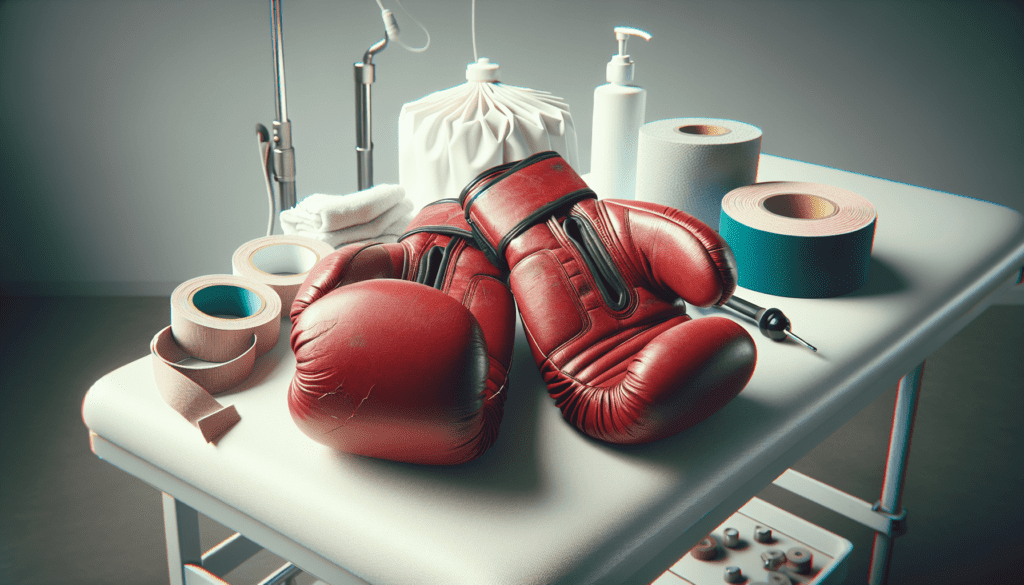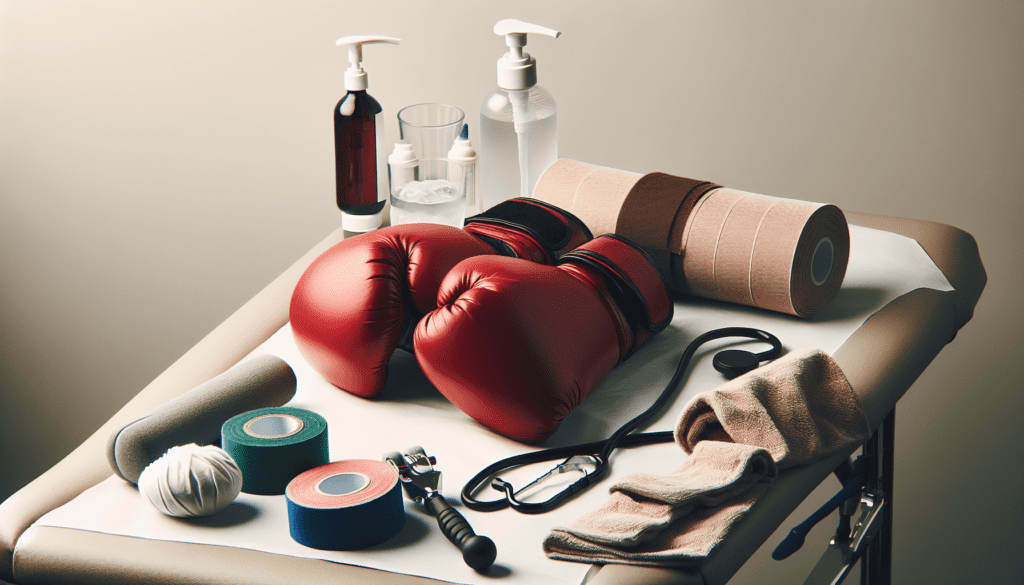In the high-octane world of Mixed Martial Arts (MMA), recovery is just as vital as training. Creating a dedicated recovery team for MMA fighters can make all the difference in their performance and career longevity. You’ll discover how to assemble a multi-disciplinary team that includes physical therapists, nutritionists, mental health professionals, and more. Each member plays a crucial role in ensuring fighters can bounce back from grueling matches and intense training sessions. Dive in to learn the essentials of building a recovery team that keeps MMA fighters at their peak, both physically and mentally. Have you ever wondered how top MMA fighters bounce back so quickly after grueling fights? Their secret lies not just in their training regimen but also in having a solid recovery team. A well-rounded recovery team isn’t just a luxury for elite fighters, but a necessity if you want to perform at your peak and extend your career. In this article, we’ll delve into the nuts and bolts of creating a recovery team specifically for MMA fighters.

Understanding the Importance of Recovery
Recovery is more than just rest. It’s about repairing the body, mind, and spirit after the punishing demands of a fight. Without proper recovery, fighters are at a higher risk of injuries, reduced performance, and burnout. Therefore, knowing how to create an efficient recovery team can be a game-changer.
Key Components of a Recovery Team
Creating a well-rounded recovery team involves incorporating professionals from various fields of expertise. Here’s a breakdown of the essential team members you should consider.
1. Nutritionist
A nutritionist plays a vital role in ensuring fighters get the right fuel to recover. From anti-inflammatory foods to supplements, a well-versed nutritionist can tailor a plan specifically for you.
Role
- Design meal plans that facilitate muscle recovery
- Advise on supplementation that supports recovery and immunity
- Monitor and adjust diets according to training demands
2. Physiotherapist
A physiotherapist specializes in movement and function. They help in healing injuries and preventing future ones through various techniques.
Role
- Offer treatments like manual therapy and electrotherapy
- Design rehabilitation programs for injured fighters
- Provide preventative care and corrective exercises
3. Sports Psychologist
Mental health is often overlooked, but it’s crucial for recovery. A sports psychologist helps fighters deal with the mental stresses of training and competition.
Role
- Provide mental conditioning techniques
- Assist in stress relief and management
- Offer strategies to deal with the pressures of competition
4. Massage Therapist
Massage therapy aids in muscle recovery by increasing blood flow and reducing muscle tension.
Role
- Perform sports massages to alleviate muscle soreness
- Assist in injury rehabilitation
- Help in muscle relaxation and stress relief
5. Strength and Conditioning Coach
Having a strength and conditioning coach ensures that you are not just recovering but also building stronger muscle groups to prevent future injuries.
Role
- Create personalized workout routines
- Monitor conditioning progress
- Implement injury prevention strategies
6. Medical Doctor
A general practitioner or sports doctor ensures that your overall health is monitored and maintained.
Role
- Conduct regular health check-ups
- Diagnose and treat minor injuries and illnesses
- Provide medical clearances and advice
7. Chiropractor
A chiropractor focuses on aligning the spine and treating musculoskeletal disorders, which is particularly useful for fighters taking a lot of hits.
Role
- Provide spinal adjustments
- Offer treatments for joint and back pain
- Give advice on posture and preventive care
Steps to Building Your Recovery Team
Building a recovery team is a systematic process. Here’s how you can start:
Step 1: Define Your Needs
Before forming a team, assess your specific recovery needs. Do you suffer from frequent injuries? Are you struggling with stress and anxiety? Understanding your unique requirements will guide you in picking the right professionals.
Step 2: Research and Vet Professionals
Finding the right professionals takes time. Research credentials, read reviews, and don’t hesitate to ask for recommendations. Ensure they’re well-versed in sports recovery, particularly MMA.
Step 3: Conduct Interviews
A consultation or interview can help in gauging whether the professional is a good fit. Prepare questions that target their experience and familiarity with MMA recovery.
Step 4: Trial Period
It’s wise to have a trial period to see how well the professionals integrate with your existing routine. Pay attention to their communication skills and their ability to adapt.
Step 5: Integration
Once you’re satisfied with your team members, work on integrating their services into your recovery regimen. Make sure everyone is on the same page regarding your recovery goals.
Effective Communication Within the Team
Effective communication is the backbone of a successful recovery team. Ensuring that all team members regularly update each other is crucial for a seamless recovery process.
Regular Meetings
Hold regular meetings, either in-person or virtually, to discuss your progress and setbacks. This helps in making necessary adjustments promptly.
Shared Documentation
Use shared platforms where all team members can access your recovery plans, session notes, and progress reports. This ensures everyone is aligned and updated.
Open Dialogue
Encourage open dialogue. Each professional brings their expertise, and an open dialogue encourages a collaborative approach to your recovery.

Creating a Recovery Plan
Once your team is in place, the next step is to create a recovery plan tailored to your needs. Here’s how you can do it:
Initial Assessment
Start with a comprehensive assessment to identify your physical and mental condition. Each team member should perform their evaluations and share the findings.
Set Goals
Define what you want to achieve through the recovery plan. Goals could range from reducing muscle soreness to improving mental resilience.
Example Goals
| Goal | Timeline | Responsible Team Member |
|---|---|---|
| Reduce muscle soreness | 1 week | Massage Therapist |
| Improve mental resilience | 1 month | Sports Psychologist |
| Recover from a minor injury | 2-3 weeks | Physiotherapist |
Create a Timeline
Outline a timeline for achieving your goals. This will provide structure and help you monitor your progress.
Implement the Plan
Now, it’s time to put the plan into action. Each professional will perform their roles while keeping the overarching recovery goals in mind.
Monitor and Adjust
Regularly monitor your progress. If something is not working, don’t hesitate to make adjustments. Your recovery team should be flexible enough to adapt.
Common Recovery Techniques
Different techniques can be employed by your recovery team to expedite your recovery. Here are some common ones:
Cryotherapy
Cold treatment can reduce inflammation and numb sore tissues.
Hydrotherapy
Using water for pain relief and treatment can be effective for sore muscles and joints.
Active Recovery
Light exercises like swimming or yoga help in reducing muscle stiffness and fatigue.
Nutrition and Hydration
Staying hydrated and consuming a balanced diet rich in essential nutrients is fundamental for recovery.
Mindfulness and Relaxation
Techniques such as meditation and deep breathing can help in mental recovery.
Tips for Effective Recovery
Even with a top-notch team, your commitment plays a critical role. Here are some tips to maximize your recovery:
Consistency is Key
Stick to the recovery plan religiously. Inconsistency can setback your progress.
Listen to Your Body
Pay attention to how your body responds to different treatments. Communicate any discomfort or issues to your recovery team immediately.
Maintain a Balanced Lifestyle
Ensure that you are not only focusing on physical recovery but also maintaining a balanced lifestyle, including good sleep and mental peace.
Stay Educated
Knowledge is power. Staying informed about the latest recovery techniques can offer additional benefits to your existing regimen.
The Investment in Recovery
Having a recovery team is an investment. Despite potential costs, the long-term benefits such as prolonged career, enhanced performance, and reduced downtime make it worthwhile.
Financial Planning
Budgeting for your recovery is essential. Consider the costs involved and plan accordingly.
Sample Budget Plan
| Service | Frequency | Monthly Cost |
|---|---|---|
| Nutritionist | Weekly | $200 |
| Physiotherapist | Bi-weekly | $300 |
| Sports Psychologist | Monthly | $150 |
| Massage Therapist | Weekly | $250 |
| Strength & Conditioning Coach | Bi-weekly | $400 |
| Medical Doctor | Quarterly Check-up | $100 |
| Chiropractor | Monthly | $120 |
Long-Term Benefits
Short-term costs associated with forming a recovery team will pay off through long-term benefits, such as fewer injuries and improved overall performance.
Real-Life Success Stories
Success stories can be incredibly motivating. Hearing how other fighters have benefited from a specialized recovery team can provide invaluable insights.
Case Study 1: Fighter A
Fighter A, who suffered from chronic shoulder injuries, formed a recovery team that included a physiotherapist, massage therapist, and nutritionist. Within six months, he was not only injury-free but also saw a significant improvement in his performance.
Case Study 2: Fighter B
Fighter B was struggling with mental stress and inconsistencies in performance. By incorporating a sports psychologist and implementing mindfulness techniques, he managed to turn his career around within a year.
Conclusion
Building a recovery team for MMA fighters may require time, effort, and financial investment, but the benefits far outweigh these initial hurdles. With the right professionals in your corner, you can focus more on your training and less on injury-related downtime. Every fighter is unique, so tailor your team and recovery plan to meet your specific needs and goals. Never underestimate the power of a well-rounded recovery strategy; it can be the difference between a short-lived career and a lasting legacy in MMA.
If you’re serious about your MMA career, start building or refining your recovery team today. Your future self will thank you!

